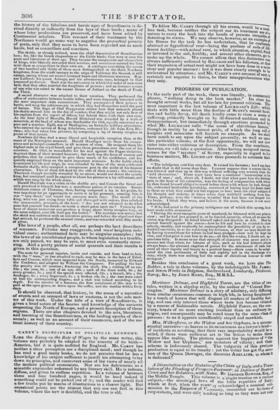PROGRESS OF PUBLICATION.
IN the early part of the week, there was literally, in commercial phrase, " nothing doing in the book market." Its close las brought several works, but all too late for present criticism. The most important is the last volume of LOCKHART'S Life; which deals with little more than the decline of SCOTT'S mental fatal. ties and bodily decay, till death kindly came to close a scene of suffering, primarily brought on by ill-directed ambition and its disappointment, but immediately through exertions promoted by what Mr. LOCKHART calls "the sense of chivalrous honour," though in reality by an honest pride, of which the long roll of knights and monaichs will furnish no example. As we shall have much to say upon the subject generally, as well as upon this particular volume, at the first opportunity, we will not now enter into either criticism or description. From the conclusion, however, we will take a quotation. After having assigned various causes for the " mystery" of SCOTT, especially in regard to his business matters, Mr. LOCKHART thus proceeds to estimate their effects.
"The indulgence cost him very dear. It ruined his fortunes; but! can hoe no doubt that it did worse than that. I cannot suppose that a nature like his
was fettered and shut up in this way without suffering very severely from the ' cold obstruction,' Ihere must have been a continual insurrection' in hit 'state of man ;' and, above all, I doubt not that what gave him the bitterest
pain in the hour of his calamities, was the feeling of compunction with which he then found himself obliged to stand before those with whom he had, through life, cultivated brotherlike friendship, convicted of having kept his heart cloyed
to them on what they could not but suppose to have been the chief subjects of his thought and anxiety, in times when they withheld nothing from him. These, perhaps, were the wtitten troubles' that had been cut deepest into his brain. I think they were, and believe it the more, because it was never acknowledged.
" If he had erred in the primary indulgence out of which this sprang, beat least made noble atonement.
"During the most energetic years of manhood, be laboured with one priests view ; and he had just grasped it, as he fancied, securely, when all at once the vision was dissipated : he found himself naked and desolate Ms Job. How he nerved himself against the storm—how he felt and how he resisted it—bow soberly, steadily, and resolvedly he contemplated the :possibility of yet, by re. doubled exertions, in so far retrieving his fortunes, as that no man should lose
by having trusted those for whom lie had been pledged—how well he kept his vow, and what price it cost him to do so,—all this the reader, I doubt not, sp, preciates fully. It seems to me that strength of character was never put to a 'severer test than when, for labours of love, such as his had hitherto almost always been—the pleasant exertion of genius for the attainment of ends thst owed all their dignity and beauty to a poetical fancy—there came to be saute gated the iron pertinacity of daily and nightly toil in the discharge of duty, which there was nothing but the sense of chivalrous honour to maks stringent."


























 Previous page
Previous page